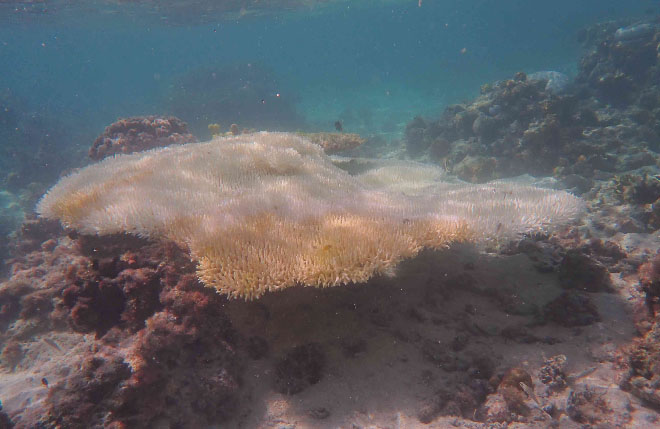Myrtha Pools
Founded in 1961, Myrtha Pools® quickly became Italy’s première swimming pool company, and has since grown into one of the world's leading swimming pool construction…
read more
University of Sydney marine scientists have highlighted the extent of coral bleaching and mortality that occurred on the southern Great Barrier Reef during the 2023-2024 global marine heatwave.
The implications of this research extend beyond the ecology and conservation. Coral reefs provide essential services to human communities, including fisheries, tourism and coastal protection. As the Great Barrier Reef faces increasing threats from climate change, the study calls for a collaborative approach to conservation that involves local communities, scientists and policymakers.
The team of marine scientists from the University of Sydney published the first peer-reviewed study in ‘Limnology and Oceanography Letters’ which documents the devastating coral bleaching events that occurred.
Led by Professor Maria Byrne from the School of Life and Environmental Sciences, the research highlights the alarming impact of unprecedented marine heatwaves on coral ecosystems, raising urgent concerns for marine biodiversity and the communities that depend on these vital ecosystems.
The research team meticulously tracked the health of 462 coral colonies at the University of Sydney's Great Barrier Reef research station at One Tree Island over a period of 161 days.
The results revealed that 66% of the colonies were bleached by February 2024 and 80% by April. By July, 44% of the bleached colonies had died, with some coral genera, such as Acropora, experiencing a staggering 95% mortality rate.
Professor Byrne noted "our findings underscore the urgent need for action to protect coral reefs, which are not only biodiversity hotspots but also crucial for food security and coastal protection. The southern Great Barrier Reef, despite its protected status, was not immune to the extreme heat stress that triggered this catastrophic bleaching event."
The research also highlights the complex interplay between heat stress, disease onset and coral mortality. Notably, Goniopora corals developed black band disease, contributing to the high mortality rates observed. The study emphasises that the rapid onset of bleaching and disease in corals previously considered resilient poses significant challenges for predicting the future composition of coral reef ecosystems in a warming world.
Professor Ana Vila Concejo, a co-author of the study from the School of Geosciences, added "this research is a wake-up call for policymakers and conservationists. The resilience of coral reefs is being tested like never before, and we must prioritise strategies that enhance their ability to withstand climate change. Our findings underscore the need for immediate and effective management interventions to safeguard these ecosystems."
Dr Shawna Foo, a Sydney Horizon Fellow and co-author of the study shared "seeing the impacts on a reef that has largely avoided mass bleaching until now is devastating. The high rates of mortality and disease, particularly in such a remote and pristine area, highlight the severity of the situation. Although the reef's highly protected status may not have prevented the impacts of the heatwave, its role in facilitating recovery will be crucial to observe."
Image.Bleached Agophora table coral One Tree Island Reef April 2024. Credit: University of Sydney
12th April 2024 - New video footage reveals worst coral bleaching ever seen for Greater Barrier Reef
25th March 2022 - Severe coral bleaching revealed on Great Barrier Reef as UNESCO/IUCN considers whether to recommend ‘in danger’ listing
18th March 2022 - Great Barrier Reef suffers another bleaching event ahead of United Nations assessment visit
7th April 2020 - Reef tourism industry and conservationists demand climate action following release of new bleaching survey
5th March 2020 - Great Barrier Reef tourism operators highlight the distressing impacts of coral bleaching
8th June 2018 - Coral bleaching leads to fall in domestic tourism to Great Barrier Reef
25th March 2017 - Report suggests Great Barrier Reef coral bleaching could deter one million visitors
14th October 2015 - Tourism industry alarm at global coral reef bleaching
Support our industry news service
We hope that you value the news that we publish so while you're here can we ask for your support?
As an independent publisher, we need reader support for our industry news gathering so ask that - if you don't already do so - you back us by subscribing to the printed Australasian Leisure Management magazine and/or our online news.
The Complete Guide to Leisure Industry Products & Services.
Founded in 1961, Myrtha Pools® quickly became Italy’s première swimming pool company, and has since grown into one of the world's leading swimming pool construction…
read moreiEDM integrate Design, Engineering and Delivery Management services to convert existing spaces into exciting new entertainment venues. Our team consists of highly qualified professionals with diverse…
read moreAustralia’s leading manufacturer of horizontal and vertical media filters suited to all types of commercial pools, water playgrounds marine parks, aquaculture and zoos. They are an ideal…
read morePricemark supplies a wide range of custom branded membership & RFID access products for the Health & Leisure Industry.
read moreTPEC Pool Enclosures provide a large range of premium commercial and residential retractable swimming pool, spa and terrace enclosures throughout Australia, servicing residential, local government…
read moreHydrocare Pool Services Pty Ltd offer 30 years of experience in aquatic industry features, products and water treatment. Hydrocare Pools has undertaken water treatment for aquatic centres and…
read moreAugmented Creative is an open organization of like-minded and highly dedicated, creative people who conceive, plan and execute visual solutions. We pursue new and innovative visual ideas to help…
read moreGet your business noticed in our targeted directory. Viewed by 10,000 industry professionals per week!